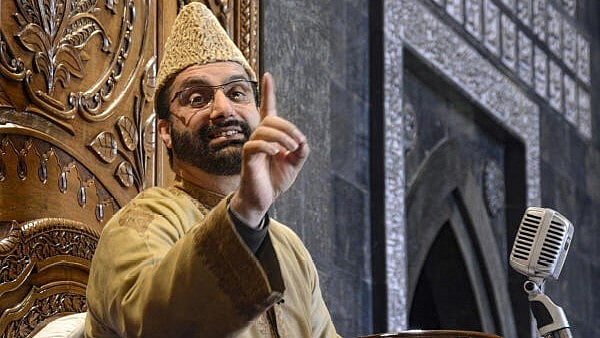
Hurriyat Conference chairman and Kashmir’s chief cleric Mirwaiz Umar Farooq
Credit: PTI Photo
Srinagar: In a move that many see as a significant departure from his decades-long separatist rhetoric, Kashmir’s chief cleric and Hurriyat Conference chairman, Mirwaiz Umar Farooq, on Sunday turned his attention to a pressing civic issue in Srinagar—an unusual shift that is being interpreted as a sign of political repositioning in a dramatically changed Kashmir.
Posting on X, Mirwaiz described the stench emanating from the Achan garbage landfill on the city’s outskirts as a “full-blown public health and environmental crisis.”
“The stench from areas adjoining Achan garbage landfill is spreading across the city, making life unbearable for residents. Over 11 lakh metric tonnes of legacy waste lie rotting there, with 550 tonnes dumped daily,” Mirwaiz wrote, citing rising cases of respiratory and skin diseases among residents. “Even I smell the stench despite living far from Achan, especially in the evenings.”
He said the information was shared with him by RTI activist Raja Muzaffar, and that distressed residents and local mohalla committee members had visited him, urging him to raise the issue from the pulpit at Srinagar’s historic Jamia Masjid. “Inshallah, I will raise it this Friday,” he added. “Before making Srinagar a smart city, can it be made stench-free and livable?”
While his concerns echoed the frustrations of Srinagar’s residents, long plagued by poor waste management, it was the identity of the messenger that caught attention. For over 30 years, Mirwaiz’s platform—especially his sermons at Jamia Masjid—focused almost exclusively on political issues: resistance to Indian rule, advocacy for the implementation of UN resolutions on Kashmir, alleged human rights violations, and a pro-Pakistan stance. Bread-and-butter concerns like sanitation, public health, and infrastructure rarely figured in his discourse.
But things have changed since August 2019, when the abrogation of Article 370 dismantled the region’s special status and led to a crackdown on separatist politics. Mirwaiz, along with other Hurriyat leaders, was detained. After his release from house detention in 2023, he spoke of “new realities” and the need to “engage with the ground.”
His focus on civic issues is being seen as part of a broader recalibration.
“With separatist politics sidelined and the pro-Pakistan narrative losing ground, Mirwaiz may be trying to reinvent himself—from a symbolic resistance figure to a leader addressing local concerns,” said a political observer. “He’s always been more moderate than others in the Hurriyat. This could be his way of remaining relevant.”
Unlike hardliners, Mirwaiz has not been charged under the Public Safety Act or with terrorism-related offences, and continues to enjoy a unique religious status as the Mirwaiz of Kashmir—a role that carries historical and social weight. This legacy position may be one reason the government has opted to keep channels open with him, rather than pushing for confrontation.
Still, skepticism persists.
“Whether it’s a genuine shift or just a survival strategy is unclear,” said a former university professor in Srinagar. “But what is clear is that Mirwaiz is speaking a new language—and it’s one that both the state and many ordinary people may be more willing to hear.”
With the political landscape in Kashmir undergoing a profound transformation, Mirwaiz’s evolving role will be closely watched. His new focus on civic issues could mark the beginning of a redefined leadership style in the Valley—one that prioritizes pragmatic concerns over ideological posturing.